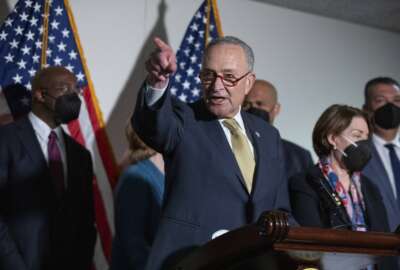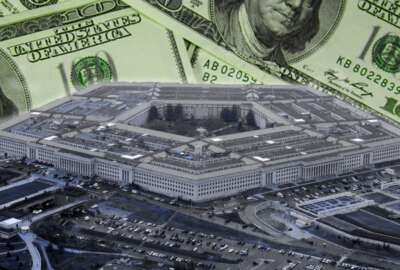Hubbard Radio Washington DC, LLC. All rights reserved. This website is not intended for users located within the European Economic Area.
On Air: Federal News Network
Trending:
The military has a hard time doing its job when Congress doesn’t do its job
Retired Marine Corps Maj. Gen. Arnold Punaro, chairman of the National Defense Industrial Association, joined the Federal Drive with Tom Temin for more.
Best listening experience is on Chrome, Firefox or Safari. Subscribe to Federal Drive’s daily audio interviews on Apple Podcasts or PodcastOne.
What an irony! Congressional appropriations committees hold hearings on what harm might hit the military from Congress’s own inability to pass a budget on time. But the security threat is real, according to retired Marine Corps Maj. Gen. Arnold Punaro. The chairman of the National Defense Industrial Association joined the Federal Drive with Tom Temin for more.
Interview transcript:
Tom Temin: Gen. Punaro, good to have you back.
Arnold Punaro: Privileged to be here.
Tom Temin: Alright so continuing resolution, things perk along just fine seemingly. What’s different about this year? Why is this worse for the military now?
Arnold Punaro: Well Tom, I would say we have to look at the external and internal threats. We are in a probably most unstable and dangerous world situation, in the 45-plus years, I’ve been working in national security, and we’re in a CR since Oct. 1 at a the time when we ought to be deterring Russia and China. As you know, China’s on the march, Russia is on the move. North Korea is now on the advance, Iran’s on the verge of a nuclear weapon, inflation’s on the rise, and we’re losing close to $6 billion a month in purchasing power for our national security. And this, by the way is not just the Pentagon, it’s the entire intelligence community, including the CIA. It’s the warfighting combatant command, a European Command that has to deal with Russia, the Indo Pacific Command that has to deal with China, it’s basically the inability to start progress on hypersonic weapons and quantum and artificial intelligence. And by the way, it also affects the domestic agencies. We shouldn’t just basically be benign about this, because Homeland Security, everything is affected by a CR that requires spending at last year’s level. And that’s just not what we need in the world we live in today. So this is a very different situation than we normally have in the annual continuing resolution that runs for a couple of months. But guess what, we’re already into month four, and they’ll never get it completed by Feb. 18. They’re gonna end up hopefully, with a deal, but then with another two to three weeks to work it out. So we’re looking at a continuing resolution that runs for half of the entire fiscal year this year.
Tom Temin: Yeah, that is worse than normal. I guess it’s better than a shutdown. But that’s not really saying much. And just a couple of detailed questions on budget implications for the military: The president said that 9,000 troops would be put on high alert in Europe, and then later 3,000 would be moving, I think, to Romania, that are actually on the march and almost deployed along with Romanian forces. That all doesn’t come for free, does it? And none of it was budgeted, correct?
Arnold Punaro: Well, Tom, I would say that we have 1.3 million active duty personnel. And certainly, we can identify 9,000, 10,000 troops that can be more ready than some of the others. Under the CR obviously day to day readiness has been affected. It’s always affected. You do less training, tank training, miles, fighter pilots flying the hours they need to fly, ship steaming and things like that. But that’s a very small number of personnel. And I know our military will not send people forward that aren’t 100% ready. But that just kind of masks over the bigger issue because the military right now is not able to modernize with a lot of the new weapons they need. They’re not able to implement the European Defense Initiative or the Pacific Defense Initiative. President Biden has actually signed an authorization act of $790 billion for defense, it’s $35 billion higher than FY ’21. So $35 billion they don’t have access to but yes, we can find 9,000 or 10,000 troops to be more ready. And if they need to go forward, they can. But if we got into something much larger then you really wouldn’t see an impact.
Tom Temin: Right and there’s no overseas contingency operation, in theory, at least in this budget, or maybe the same things have been moved to other lines. But can you envision an OCO being needed suddenly if, God forbid, we have to actually shoot, say, in Russia?
Arnold Punaro: Tom, yes, it really will be an OCO for inflation. DoD basically budgeted under the previous administration what’s called a gross domestic product deflator that was under 2%. Inflation right now is running 7%, fuel inflation for the Department of Defense, which is the world’s largest consumer of fuel, is five times what they budgeted so arithmetically right now we’ve already lost $25 billion in purchasing power. Number two, 3% inflation is a $20 billion hit to DoD, 6% inflation is a $40 billion hit. So Congress is going to have to make an adjustment just to cover inflation in a way that basically the OCO was really for unintended overseas operations. This will be unintended inflation, so we’re gonna have to deal with that as well. Also, what’s eroding the purchasing power of the department, the intelligence community and our domestic agencies.
Tom Temin: We’re speaking with Arnold Punaro. He is chairman of the National Defense industrial Association and retired Marine Corps major general. We should also point out you did a stint for the Senate Armed Services Committee as a staff member At some point in your career, and what do you think is going on in the Armed Services committee’s thinking? Because Republican or Democratic, they generally get the military requirement and understand the needs and requirements of the military. They must be pulling their hair out as members of those committees even as they are in the larger institution that can’t get out of its own way.
Arnold Punaro: Tom, excellent observation and I worked 24 years in the Senate, 14 years as staff director of the Senate Armed Services Committee, and the good news today, that committee operates on a bipartisan basis, just like it did when I was there, with Sen. Sam Nunn and John Warner, Strom Thurmond, John Glenn, many people like that. This year, Sen. Inhofe, the ranking member proposed an increase in defense spending that Chairman Jack Reed went along with so a plus-$25 billion. The House Armed Services Committee went along with that, Adam Smith and Mike Rogers, and they passed the National Defense Authorization Bill. Eighty-eight members of the Senate supported it. The President signed it into law. By the way, the companion appropriation committee, John Tester and [Richard] Shelby also marked up their defense appropriation bill at the higher level that was approved by the Senate. And so the defense committees, you’re right, they are doing their job. They’re not the problem and they are very concerned. Sen. Jack Reed as chairman gave a very compelling floor speech on the Senate floor Tuesday night, outlining all the incredible downsides of a year long continuing resolutions. Tom, being frank, there’s no adjective strong enough to describe the ill effects of what a year-long continuing resolution would be. And for those that are advocating not only armed services and defense appropriation, but there are those in the Congress that are advocating, okay, a year-long CR would be okay, they didn’t pass fourth grade arithmetic. Because if you look at it over a year, my calculations that we now have in the [National Defense Industrial Association] white paper, and frankly, behind the scenes, unofficially, I checked it with a lot of smart people both in the legislative and executive branch, we would lose between $76 and $100 billion a year for defense, which is worse than the worst year of sequester, which Gen. David Goldfein said took five years for them to recover their warfighting readiness. We’re looking at levels of spending that would be catastrophic for our national defense. And frankly, it’s hard for me to understand why the Congress can’t get its act together. Norm Ornstein, one of the great observers of the Congress calls Congress the broken branch. Well, when it comes to this CR, they’re about as broke as broke can get.
Tom Temin: Alright, so readiness would be hurt, development underway, hypersonics, modernized nuclear delivery system, there’s new bombers, lots of programs that can’t get very far. And then a lot of these then devolve to the defense industrial base, of which representing at the NDIA. And what are contractors saying about this? And what’s the effect on them?
Arnold Punaro: Well, Tom, I think you have to also look back at what our industry has been through for the last two years with COVID. We are one of the few industries that basically when there was no protection, there was no vaccine, there was no masks, there was no nothing, our industry stepped up to the plate and came to work, unlike a lot of other industries. Totally understandable, but we basically came to work for national security. And now it’s been a real strain on our supply chain. We actually are publishing a new report today called Vital Signs, where we are assessing that the health of our industry right now does not have a passing grade, because all of these things. The industry’s been consolidating for decades. And so unfortunately, if we have that year-long CR, the large primes have a lot of cash reserves. But there are 1,700 companies that are a member of NDIA. Most of them are small and medium. They won’t survive a year-long CR. They can’t basically just stay there and wait for the department to basically start paying the bills. And so the combination of COVID, the combination of CR, if it goes any – it’s already had a detrimental effect, it would have a very, very profound effect on our industry. And frankly, if you look at it, government doesn’t build anything anymore. It all comes from industry. So the high technology, the great systems that we need so our warfighters are never in a fair fight come from our industry. But if the government can’t fund it, [it isn’t] going to be there. I’ve never been more worried and more concerned about our national security. And again, I’ve been doing this for over 50 years.
Tom Temin: Arnold Punaro is chairman of the National Defense Industrial Association, and retired Marine Corps major general. As always, thanks so much for joining me.
Arnold Punaro: Great to be with you. It’s such a great program and it’s so important for your listeners to be informed and educated on all these issues.
Copyright © 2024 Federal News Network. All rights reserved. This website is not intended for users located within the European Economic Area.
Tom Temin
Tom Temin is host of the Federal Drive and has been providing insight on federal technology and management issues for more than 30 years.
Follow @tteminWFED
Related Stories
Related Topics
All News
Arnold Punaro
Budget
China
Congress
continuing resolution
Defense
Defense Industry
Defense News
defense spending
Federal Drive
House Armed Services Committee
Intelligence Community
Management
military readiness
National Defense Industrial Association
national security
Pentagon
Russia
Senate Armed Services Committee
Tom Temin
On DoD

WEDNESDAYS, 11 A.M. & 2 P.M.
Each week, Defense Reporter Jared Serbu speaks with the managers of the federal government's largest department. Subscribe on PodcastOne or Apple Podcasts.





